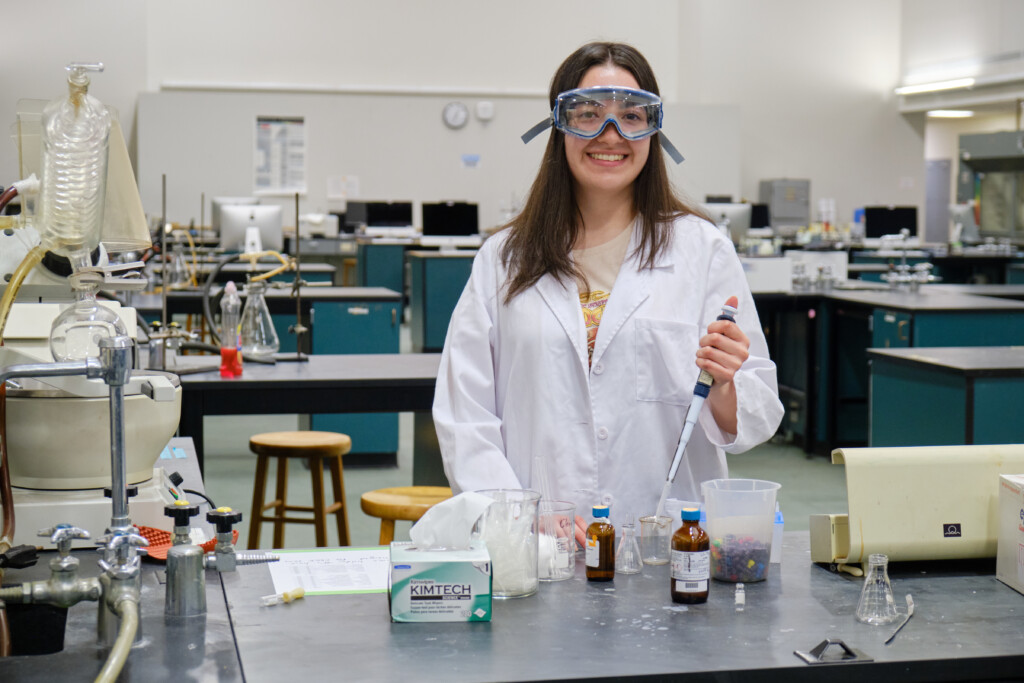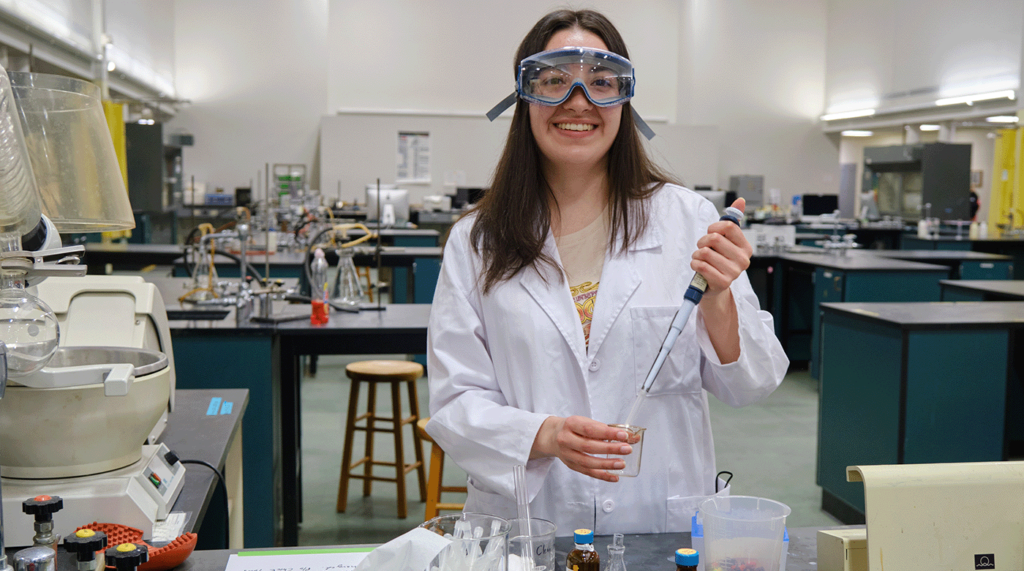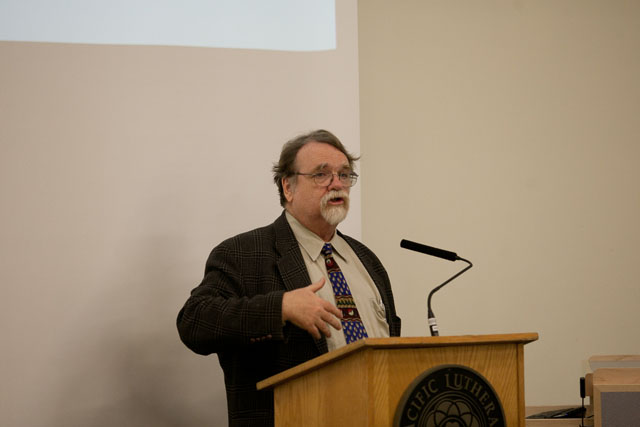Page 14 • (234 results in 0.013 seconds)
-

The K.T. Tang Faculty Excellence Award in Research recognizes up to two faculty scholars who have made significant contributions to their disciplines through disseminating research findings related to the discovery, integration, or application of knowledge. Chair of the Physics Department Bret Underwood was one of…
, in honor of his former professor, K.T. Tang, Professor Emeritus of Physics. University President Allan Belton (left) presents Chair of the Physics Department Bret Underwood (right) with the 2023 K.T. Tang Faculty Excellence Award in Research. (Photo PLU / Emma Stafki) Read Previous Professor Wendy Shore receives 2023 Faculty Excellence Award in Mentoring Read Next Back in the lab: an unexpected path led Angela Rodriguez Hinojosa ’24 to organic chemistry LATEST POSTS Three students share how
-

Food Symposium addresses the many ways food impacts the world. The ethics of food By Katie Scaff ’13 The PLU Philosophy Department’s Food Symposium Feb. 21 will address the ethics revolving around food. Keynote speaker, Paul B. Thompson – the W.K. Kellogg Chair in Agricultural,…
encouraged to attend. The program concludes with Thompson’s keynote address. Sessions addressing a variety of food related issues begin at 11 a.m., Feb. 21. An array of students and faculty, as well a numerous local and national experts, will present on a variety of topics, including how to know what goes into your food, pragmatism and meat production, and food passions. Some of the presenters include, Holly Foster, owner of Zestful Gardens, who will talk about a life in organic farming, Joe Markholt, a
-

The 11th Biennial Wang Center symposium, “ The Matter of Loneliness: Building Connections for Collective Well-Being ,” will be held at Pacific Lutheran University on March 7-8. Hosted by PLU’s Wang Center for Global and Community-Engaged Education , the two-day conference will bring together academics,…
for Collective Well-BeingMarch 7-8, 2024 Anderson University CenterLEARN MORE Read Previous PLU professor curates an Oxford Univ. museum collection at the intersection of religion, medicine and disability Read Next Back in the lab: an unexpected path led Angela Rodriguez Hinojosa ’24 to organic chemistry COMMENTS*Note: All comments are moderated If the comments don't appear for you, you might have ad blocker enabled or are currently browsing in a "private" window. LATEST POSTS Caitlyn Babcock ’25
-

As a child, chemistry major Yaquelin Ramirez ’22 often went to work with her mother at a Federal Way nursing home. The time spent watching her mom help the residents sparked something inside of her — a desire to pursue a career where she helps…
.“That experience helped me grow as a person and in my chemistry career,” she said. In the classroom, her aptitude was quickly noticed, leading to her becoming an organic lab teaching assistant in the fall of 2020 and 2021, and an invitation to be a student guest of the American Chemical Society at the Linus Pauling Award Symposium Banquet. “Yaquelin impresses you with her work ethic, diligence, and academic abilities,” Craig Fryhle, chemistry professor, said. “She is a very personable, earnest, and
-
Swager press release July 26, 2016
is described by colleagues as an “incredibly creative and inventive organic chemist.” They say that he does not just publish papers, he takes the next steps to be sure that the materials are used in applications that protect the public and the military, are used in the food and agriculture industry, and make a significant impact on human welfare. He has published more than 400 peer reviewed manuscripts and has more than 70 issued patents. Dr Swager’s awards include the 2016 Gustavus John Esselen
-

As a child, chemistry major Yaquelin Ramirez ’22 often went to work with her mother at a Federal Way nursing home. The time spent watching her mom help the residents sparked something inside of her — a desire to pursue a career where she helps…
noticed, leading to her becoming an organic lab teaching assistant in the fall of 2020 and 2021, and an invitation to be a student guest of the American Chemical Society at the Linus Pauling Award Symposium Banquet. “Yaquelin impresses you with her work ethic, diligence, and academic abilities,” Craig Fryhle, chemistry professor, said. “She is a very personable, earnest, and talented young woman who has a bright future ahead of her.” As Ramirez wraps up her time at PLU, she reflected on the most
-

Lisa Woods ’92 leads initiatives to help improve systems and services as the City of Tacoma’s chief equity officer. She says her approach to this work starts with listening and continuously thinking about how best to center community voices, experiences and needs. How can centering…
unfiltered and allows organic dialogue to happen.Lute Powered: City of TacomaThe City of Tacoma provides high-quality, innovative and cost-effective municipal services that enhance the lives of its 215,000 residents and the quality of its neighborhoods and business districts. PLU alumni Tom Chontofalsky ’03, Clarissa Gines ’12 and Lisa Woods ’92 are three of the many Lutes who serve the public good at the City of Destiny. Read more stories from the Fall 2022 issue of ResoLute Magazine. Read Previous
-
Art grants support PLU faculty PLU faculty members Holly Senn and Greg Youtz were among 80 Washington state artists to receive awards from the Grants for Artist Projects (GAP) program, funded by Artist Trust .The GAP program provides support for artist-generated projects, and is open…
record 975 artists applied for the awards. Both Senn, virtual reference services librarian, and Youtz, professor of music, received the maximum award of $1,500. A visual artist, Senn uses discarded library books to make sculptures and installations that explore the lifecycle of ideas. It’s an organic, non-linear process, she explains, where thoughts are born, disseminated, and then adopted or forgotten. She finds inspiration in the natural world, from the variety of books she finds and in her work as
-

Paul B. Thompson, the W.K. Kellogg Chair in Agricultural, Food and Community Ethics at Michigan State University gave the keynote address for the Food Symposium. (Photo by Igor Strupinskiy ’14) Exploring food issues By Katie Scaff ’13 Food intersects with just about any social justice…
community during the two-day Food Symposium presented by the Philosophy Department last week. The symposium began with a series of sessions for the symposium’s presenters on Feb. 20. They started the morning with a discussion on a variety of food topics, including organic agriculture and food system sustainability, supporting local farmers and achieving changes in the food system, and food costs. Among the presenters was an array of PLU students, staff, and professors, and community members, with a
-

As a child, chemistry major Yaquelin Ramirez ’22 often went to work with her mother at a Federal Way nursing home. The time spent watching her mom help the residents sparked something inside of her — a desire to pursue a career where she helps…
enjoys. “That experience helped me grow as a person and in my chemistry career,” she said. In the classroom, her aptitude was quickly noticed, leading to her becoming an organic lab teaching assistant in the fall of 2020 and 2021, and an invitation to be a student guest of the American Chemical Society at the Linus Pauling Award Symposium Banquet. “Yaquelin impresses you with her work ethic, diligence, and academic abilities,” Craig Fryhle, chemistry professor, said. “She is a very personable
Do you have any feedback for us? If so, feel free to use our Feedback Form.


